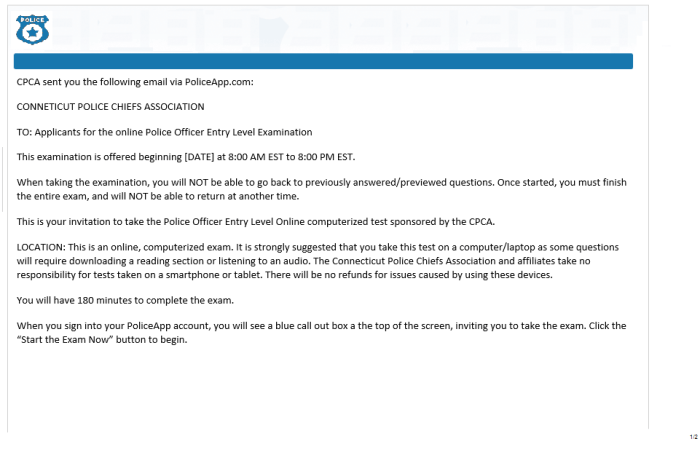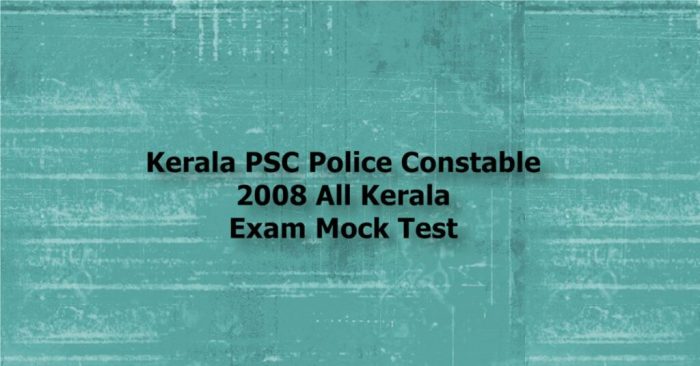Cpca entry level police officer exam – The CPCA Entry-Level Police Officer Exam stands as a gateway to a fulfilling career in law enforcement. This comprehensive guide delves into the intricacies of the exam, empowering aspiring officers with the knowledge and strategies necessary to excel.
This document provides a detailed overview of the exam’s structure, content, preparation strategies, and exam day logistics. It also addresses frequently asked questions and offers insights into the potential impact of exam results on the hiring process.
CPCA Entry-Level Police Officer Exam Overview

The CPCA Entry-Level Police Officer Exam is a standardized test designed to assess the knowledge, skills, and abilities of candidates seeking to become police officers in California.
The exam is administered by the California Police Chiefs’ Association (CPCA) and is used by many law enforcement agencies throughout the state to evaluate candidates’ suitability for police work.
Exam Purpose, Cpca entry level police officer exam
The primary purpose of the CPCA Entry-Level Police Officer Exam is to ensure that candidates possess the minimum qualifications necessary to perform the duties of a police officer effectively and safely.
The exam covers a wide range of topics relevant to police work, including:
- General knowledge
- Reading comprehension
- Writing skills
- Problem-solving abilities
- Ethics and values
- Cultural diversity
- Physical fitness
Exam Structure and Content

The CPCA Entry-Level Police Officer Exam is designed to assess the candidate’s knowledge, skills, and abilities relevant to the role of a police officer. The exam comprises multiple sections, each covering specific areas of expertise.
The exam format includes both multiple-choice and essay questions. Multiple-choice questions present candidates with several answer options, while essay questions require candidates to provide written responses demonstrating their understanding of the topic.
Content Coverage
The exam content encompasses a wide range of topics essential for police officers. These include:
- Criminal Law and Procedure:Understanding the principles of criminal law, arrest procedures, search and seizure, and constitutional rights.
- Patrol Procedures:Knowledge of patrol techniques, traffic enforcement, and crime prevention strategies.
- Report Writing:Ability to accurately document observations, incidents, and investigations in written form.
- Interviewing and Interrogation:Skills in conducting effective interviews and interrogations to gather information and build cases.
- Community Policing:Understanding the principles and practices of community-oriented policing, including building relationships with the community.
- Ethics and Professional Conduct:Adherence to ethical principles and professional standards in law enforcement.
- Physical Fitness:Ability to meet the physical demands of police work, including strength, agility, and endurance.
Preparation Strategies

Preparing for the CPCA Entry-Level Police Officer Exam requires a comprehensive approach that encompasses effective study techniques, accessing reliable resources, and being aware of common challenges.
Study Tips and Strategies
- Create a Study Schedule:Establish a consistent study schedule that allows for dedicated study time each day.
- Focus on Key Concepts:Identify the core topics covered in the exam and concentrate on understanding these concepts thoroughly.
- Use Practice Tests:Take practice tests to assess your knowledge, identify areas for improvement, and simulate the exam experience.
- Review Regularly:Regularly review the material covered to enhance retention and reinforce concepts.
- Study with a Group:Collaborate with other candidates to discuss concepts, share insights, and support each other.
Resources for Study Materials
Numerous resources are available to support your preparation for the exam:
- CPCA Study Guide:The official study guide provides comprehensive coverage of the exam content.
- Online Courses:Several online platforms offer preparation courses tailored to the CPCA exam.
- Books and Textbooks:Textbooks and reference books provide in-depth information on the topics tested.
- Practice Tests:Practice tests are essential for assessing your progress and identifying areas for improvement.
Common Challenges and Pitfalls
Be aware of potential challenges during your preparation:
- Time Management:Allocating sufficient time for study while balancing other commitments can be challenging.
- Stress and Anxiety:Exam preparation can induce stress and anxiety; managing these emotions is crucial.
- Procrastination:Overcoming the tendency to postpone studying is essential for effective preparation.
- Lack of Motivation:Maintaining motivation throughout the preparation process can be challenging; seeking support and setting realistic goals can help.
- Limited Resources:Access to reliable study materials and resources may be limited for some candidates.
Exam Day Logistics: Cpca Entry Level Police Officer Exam

Exam day procedures ensure the integrity and fairness of the CPCA Entry-Level Police Officer Exam. Understanding these protocols helps candidates prepare effectively and minimize stress on exam day.
Check-In Procedures
Candidates should arrive at the exam site at least 30 minutes before the scheduled start time. They must present a valid government-issued photo ID, such as a driver’s license or passport, for verification.
Identification Requirements
The photo ID must clearly display the candidate’s name, photograph, and signature. It should not be expired or damaged.
Test-Taking Conditions
The exam is typically administered in a controlled environment with limited distractions. Candidates may be seated in cubicles or at individual desks. They are provided with pencils, erasers, and scratch paper.
Time Management
The exam is timed, and candidates should allocate their time wisely. It is advisable to spend more time on questions they are confident about and return to more challenging ones later.
Pacing
Candidates should pace themselves throughout the exam to avoid rushing or getting stuck on difficult questions. Skipping questions and returning to them later can help maintain a steady pace.
Stress Management
It is normal to experience stress during the exam. Candidates can manage stress by practicing relaxation techniques, such as deep breathing or visualization exercises, before and during the exam.
Scoring and Results

The CPCA Entry-Level Police Officer Exam employs a standardized scoring system to evaluate candidates’ performance. The exam results play a crucial role in determining the eligibility of candidates for subsequent stages of the hiring process.
Upon completion of the exam, candidates receive a numerical score that reflects their overall performance. The scoring system is designed to ensure fairness and consistency in the evaluation process.
Exam Result Notification
Exam results are typically released within several weeks of the exam date. Candidates are notified of their results via email or mail. The notification includes the candidate’s score and an explanation of the scoring process.
Interpreting Exam Results
Candidates should carefully review their exam results to understand their performance. The score report provides detailed information about the candidate’s strengths and weaknesses in each section of the exam.
Candidates should also familiarize themselves with the minimum passing score required for the position they are applying for. The passing score may vary depending on the jurisdiction and the specific department’s hiring criteria.
Impact on Hiring Process
The CPCA Entry-Level Police Officer Exam results are a key factor considered during the hiring process. Candidates who achieve a passing score may be eligible for further evaluation, such as background checks, interviews, and physical agility tests.
The hiring decision is ultimately made by the individual law enforcement agency based on a comprehensive evaluation of the candidate’s qualifications, experience, and exam performance.
Quick FAQs
What is the purpose of the CPCA Entry-Level Police Officer Exam?
The CPCA Entry-Level Police Officer Exam is designed to assess candidates’ knowledge, skills, and abilities relevant to the role of a police officer.
What is the structure of the exam?
The exam typically consists of multiple sections, including written, physical, and psychological components.
How can I prepare for the exam?
Effective preparation involves studying the exam content, practicing with sample questions, and maintaining physical fitness.
What are some common challenges during the exam?
Time management, stress, and unfamiliar question formats can pose challenges during the exam.
How are exam results used in the hiring process?
Exam results are typically used to create a pool of eligible candidates for further assessment and selection.